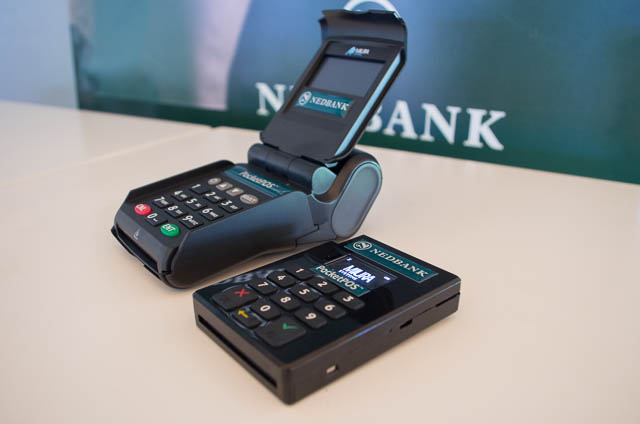
Banking group Nedbank has launched a mobile point-of-sale (POS) device, called the PocketPOS, that accepts both magnetic and chip-and-Pin credit and debit cards. The device connects to a smartphone using Bluetooth and is operated by means of a mobile application.
The PocketPOS, which requires that the smartphone have an Internet connection in order to authenticate and process a transaction, comes three months after Absa said it would launch a similar payments device, called the Pebble.
The Pebble is developed by Thumbzup, a company founded and led by technology entrepreneur Stafford Masie.
Nedbank is pitching PocketPOS to small and medium-sized businesses that don’t process sufficient card transactions to warrant a fixed POS unit and at those that want to be able to take payments on the move.
There are two models of PocketPOS.
The first is a small device with a keypad that requires the merchant to enter an e-mail address using a special smartphone application that sends a digital receipt to the captured e-mail address once the transaction amount has been accepted.
The second model offers the ability to print out two physical receipts — one for the merchant and one for the customer — of the sort a traditional POS would.
Both card-reader devices include a keypad so that customers can input their Pin code.
At launch, the PocketPOS products will support only Apple iPhones and iPads. Support for Android and BlackBerry devices will follow in the coming months, Nedbank says. The devices accept Visa, MasterCard and American Express cards.
Using the smartphone app, merchants can view detailed transaction histories. There is also a website, which can be used to view past transactions or generate a range of transaction reports.
PocketPOS offers the same level of security required of conventional POS solutions and is fully certified by Europay, MasterCard and Visa for chip-and-Pin cards. The devices use point-to-point encryption, which encrypts data at all stages of the transaction.
Ingrid Johnson, group managing executive of Nedbank’s retail and business banking division, says solutions like Square, which has proved popular in the US, are “not appropriate” for South Africa because they can only read magnetic stripes. “We had to support chip-and-Pin,” she says.
Johnson says users with existing POS units can also apply for PocketPOS devices, which will be linked to the same merchant number as any fixed units.
The devices are charged using micro USB and Nedbank claims a single charge can perform 200 transactions.

The bank hasn’t released pricing yet, but says it will offer a range of transaction bundles to cater to different users’ demands. The cost of the devices will be built into these bundles. Johnson says the cost will be roughly half that of a traditional POS unit.
The bank will trial the product with a selection of its customers beginning immediately. It intends to expand the test group in the second quarter of 2013, with commercial roll-out expected to begin around the same time.
Those using the products in the pilot phase will need to have the smartphone loaded by the bank, but eventually users will be able to download it.
Johnson says the bank has 20 000 retail customers and it will ensure that it can meet demand for the devices when they are launched commercially.
In November, Absa launched a similar device, called the Pebble. Unlike PocketPOS, the Pebble, which is developed in South Africa, doesn’t need Bluetooth. Instead, it plugs into the audio jack of mobile phone or tablet computer and can receive payments from chip-and-Pin or magnetic credit and debit cards.
The Pebble works with Visa and MasterCard, with apps for Apple and BlackBerry devices as well as for some Android phones. Absa is expected to make the Pebble commercially available before the end of the first quarter. — (c) 2013 NewsCentral Media




